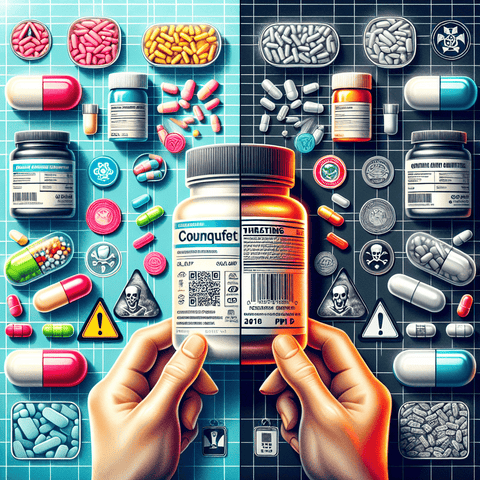What Are Third-Party Tested Supplements and Why Should You Care?
Introduction
In today’s health-conscious world, dietary supplements have evolved from niche products to household staples. Millions of consumers around the globe rely on vitamins, minerals, and herbal supplements to enhance their diets, boost immunity, support mental clarity, and promote overall well-being. From Vitamin C for its antioxidant properties to magnesium for muscle and bone support, supplements serve a valuable role in everyday wellness routines.
However, many consumers don’t realize that the supplement industry is not as tightly regulated as pharmaceuticals. In many countries, including across the European Union and the United States, supplements do not undergo the same rigorous pre-market testing that prescription medicines must endure. As a result, concerns over product safety, ingredient accuracy, and contamination often remain hidden until issues are reported post consumption.
This lack of strict oversight opens the door for potential risks: supplements may be mislabeled, contain undisclosed substances, or include uncertain doses of key ingredients. Alarmingly, some have even been found to include harmful contaminants like heavy metals, bacteria, or synthetic fillers—issues that could pose significant threats to vulnerable populations like children, pregnant individuals, or those with chronic health conditions.
Enter third-party testing: an independent and trustworthy quality control solution. Designed to verify whether a supplement contains what it claims and nothing it shouldn’t, third-party testing introduces transparency into an otherwise opaque market. Independent laboratories conduct scientific testing on supplements to confirm purity, potency, identity, and safety—helping to shield consumers from misleading claims and substandard products.
This blog post dives deep into the importance of third-party tested supplements. You’ll learn what third-party testing means, why it matters, how it safeguards your health, and how to identify truly high-quality supplements. We’ll break down certifications, lab analysis, and tips for confidently choosing brands committed to transparency. Whether you're concerned about supplement purity, exploring guarantees of quality, or simply shopping smarter, understanding third-party verified supplements is a crucial piece of your wellness puzzle.
Third-Party Tested Supplements: What They Are and Why They Matter
Third-party testing in the supplement world refers to the process in which an independent laboratory—not affiliated with the supplement manufacturer—tests products to verify claims and check for contaminants. Unlike in-house quality control, which is performed by a company’s own lab team, third-party testing ensures neutrality and impartial evaluation.
Why does this matter? The supplement marketplace is vast, and not every brand follows stringent manufacturing practices. Some rely solely on their own internal checks, or worse, skip testing altogether. In contrast, brands that opt-in for third-party testing prioritize transparency and consumer safety by letting an unbiased authority confirm that their products are clean, accurate, and truly what the label claims.
This testing can encompass a wide range of objectives, including verifying the potency of key nutrients (e.g., ensuring a magnesium supplement actually contains the listed milligrams), confirming ingredient identity (e.g., authenticating botanical extracts), and screening for contaminants like heavy metals, microbes, residual solvents, or allergens.
Several well-known third-party organizations specialize in certifying supplements through rigorous evaluations:
- NSF International – Offers the NSF Certified for Sport® program, used widely by professional athletes to verify supplements are free from banned substances.
- U.S. Pharmacopeia (USP) – Ensures products meet standards for identity, purity, strength, and disintegration, backed by extensive testing.
- ConsumerLab – Independently purchases and tests products for ingredient accuracy, contamination, and overall quality.
- Informed-Choice/Informed-Sport – Offers certification specifically for sports nutrition, screening for substances prohibited in athletic competitions.
There are numerous cases where products were found to contain contaminants or inaccurate ingredients. For example, independent assessments have uncovered supplements containing lead above allowable limits or vitamin D levels either drastically less or more than labeled. Such gaps can result in ineffectiveness—or worse—adverse health reactions. If third-party testing had been in place, these issues could have been intercepted early.
Choosing third-party tested supplements is a proactive measure to ensure consumer safety and product reliability. When you buy verified products from reputable sites like Topvitamine.com, you’re investing in peace of mind, reduced health risks, and a science-backed approach to supporting your wellness goals—whether through Vitamin D supplementation or Vitamin K for bone and blood health.
The Role of Independent Supplement Testing in Consumer Safety
Independent third-party testing plays a vital role in safeguarding consumer health—a priority that’s even more critical when supplement labeling is not routinely verified by governmental bodies before hitting the market. While reputable manufacturers often include internal quality control steps, independent testing provides external validation—offering consumers an unbiased safety net.
The testing process itself is comprehensive and rooted in scientific rigor. Certified third-party labs analyze supplements for multiple characteristics, such as:
- Ingredient Identity: Ensures that what's on the label is indeed in the product. This is crucial for botanicals and herbal extracts, where misidentification can lead to severe consequences.
- Dosage Accuracy: Tests the potency of active ingredients. For example, if a supplement lists 400 mg of magnesium, testing confirms that users are consuming the intended amount—not more, not less.
- Contaminant Screening: Detects the presence of undesirable substances like heavy metals (lead, arsenic, cadmium), microbial infections (like salmonella), mold, pesticides, and residual solvents.
- Product Stability and Shelf-Life: In some cases, labs will analyze how well the supplement maintains its potency and purity over time to ensure it meets label claims up to the expiration date.
- Manufacturing Consistency: Testing evaluates whether each batch of a supplement is consistent with others, helping avoid variation from one purchase to the next.
This testing is especially critical for sensitive populations. For example, pregnant and lactating women must avoid specific contaminants and adhere to precise micronutrient dosages. Similarly, people with allergies need assurance that their supplements are free from allergens like gluten, soy, or dairy. Athletes, governed by strict doping regulations, risk suspension if a supplement contains banned substances—even inadvertently.
As a result, we're seeing a rising consumer preference for independently tested products. People are reading labels more closely, researching certifications, and demanding transparency from their supplement providers. Informed customers ask meaningful questions—and trusted brands are answering with integrity-tested, lab-certified offerings. It's a shift towards empowerment and health advocacy, fueled by the need for authenticity in wellness products.
This makes independent testing more than just a corporate responsibility—it's a consumer expectation. And brands that embrace it are positioning themselves as leaders in safety and trust. So next time you're browsing supplements like omega-3 DHA & EPA products or Vitamin C formulations, take note of third-party test seals and lab certifications. Your health is worth that extra step.
Certified Supplement Quality: What Certifications Really Mean
When browsing supplement labels, you may encounter symbols or seals from various certifying organizations. But what do those badges mean, and how can they help you distinguish legitimate quality from marketing hype? Certification is essentially a third-party confirmation that a product has met predefined health, safety, or manufacturing standards. But not all certifications carry the same weight.
Let’s explore several of the most common supplement certifications:
- NSF Certified for Sport®: Used extensively in athletic circles, this certification ensures products are free from banned substances and manufactured in facilities that meet Good Manufacturing Practices (GMPs).
- USP Verified: The U.S. Pharmacopeia sets pharmaceutical-grade standards for vitamins and supplements, focusing on purity, potency, and manufacturing quality.
- Non-GMO Project Verified: Indicates that ingredients do not come from genetically modified organisms, validated via independent audits and DNA testing protocols.
- GMP Certified: GMP (Good Manufacturing Practice) certification confirms that products were manufactured following legally mandated quality assurance practices to minimize contamination, mix-ups, or errors.
Each of these certifications involves established protocols, scientific testing, and thorough documentation. However, not all claims on labels go through meaningful vetting. Phrases like “all natural” or “pure” may sound appealing but often lack regulatory definitions or scientific backing. This is where the distinction between "certification" and mere "marketing compliance" becomes critical.
Third-party certification requires that an external organization evaluates and approves a product using its own objective criteria. In contrast, manufacturer self-claims are unenforced assertions made without any evidence offered to the public. Relying on trusted certifications ensures that another set of unbiased eyes has reviewed the product’s composition and quality.
When reading labels or visiting product pages on platforms like Topvitamine.com, always look for recognized certification logos, details about lab accreditation, and public test results. Some brands even provide batch numbers and interactive QR codes that let consumers track test documentation directly.
Consumers should consider the following tips for evaluating supplement certifications:
- Look for specific third-party logos mentioned above.
- Research certifications you are less familiar with.
- Always prioritize products that explain their testing process.
- Be cautious of vague or decorative label language not tied to real analysis.
Only through due diligence can consumers confidently select supplements that meet their wellness needs. Certifications aren't just stickers—they're evidence of a brand’s commitment to quality, safety, and transparency.
Unbiased Lab Analysis: How It Builds Brand Trust and Transparency
Unbiased lab analysis means that the evaluation of a supplement's composition is performed by a neutral third party with no conflicts of interest or financial stake in the testing outcome. This impartiality ensures that lab results are scientifically valid and uninfluenced by manufacturing priorities or marketing agendas.
Why is neutrality so important in supplement testing? Because it builds trust—one of the most important currencies in the wellness market. When consumers know that an external body has verified product quality without internal pressure, they’re more likely to believe the product information provided. That trust translates into customer loyalty and brand reputation, both of which are essential in a competitive landscape.
One of the biggest advantages of unbiased testing is the confirmation of “clean labeling.” Reputable supplement brands voluntarily publish their lab results and share raw data such as heavy metal screenings, allergen panels, and ingredient purity. This transparency appeals not only to existing customers but also to highly educated health professionals who may recommend products based on analytical rigor rather than slick advertising claims.
Brands that embrace this practice often display test documentation on their websites, some even linking to verifiable lab reports. Consumers visiting Topvitamine.com can rest assured that supplements carried on the platform have undergone scrutiny and comply with tight quality assurance practices. This visibility helps shoppers make informed decisions and support trustworthy companies.
Examples of companies that have fully embraced transparency include supplement lines that post their Certificate of Analysis (COA) for every batch or provide access codes on product packaging for result retrieval. This fosters a feedback loop where high-performing labs and honest brands amplify each other’s credibility.
The end result is mutual benefit: brands build a loyal customer base, and shoppers gain assurance that their purchases are safe, effective, and ethically produced. Transparency, powered by unbiased testing, transforms supplement brands from vendors into healthcare partners.
Supplement Purity Verification: Ensuring What’s In (and Not In) Your Product
One of the cornerstones of quality supplements is purity—assurance that a product is free from contaminants, adulterants, and unnecessary fillers. Pure supplements do not just offer cleaner health interventions; they reduce the likelihood of allergic reactions, toxicity, and negative interactions with medications.
Unfortunately, the supplement world isn't immune to problematic ingredients. Industry reports have uncovered products laced with heavy metals like mercury and cadmium, pesticide residues on plant-based products, or harmful solvents used during extraction. Without robust third-party testing, such contaminants may remain undetected by manufacturers or unreported to consumers.
Third-party laboratories play a vital role in verifying supplement purity according to standardized methodologies. These include gas and liquid chromatography for detailed chemical breakdowns, mass spectrometry to detect heavy metals, microbial analysis for detecting bacteria or yeast, and allergen panels to ensure absence of soy, gluten, peanuts, lactose, or shellfish.
High-quality third-party tested supplements also undergo inspection for synthetic additives, colorants, and preservatives that may not align with clean-label expectations. These screenings ensure that only safe, effective ingredients enter your system—essential if you’re using supplements to address nutrient deficiencies or dietary gaps.
To verify whether a supplement has been vetted for purity, look for these indicators:
- Third-party certification logos such as USP or NSF.
- COAs available via a brand's website, QR code, or upon request.
- Ingredient transparency with articulation of source, standardization, and absence of common allergens or adulterants.
On Topvitamine.com, many offerings—including magnesium supplements chosen for energy and bone support—are selected based on supplier purity standards. Choosing verified products elevates your supplement experience from hopeful to healthful.



